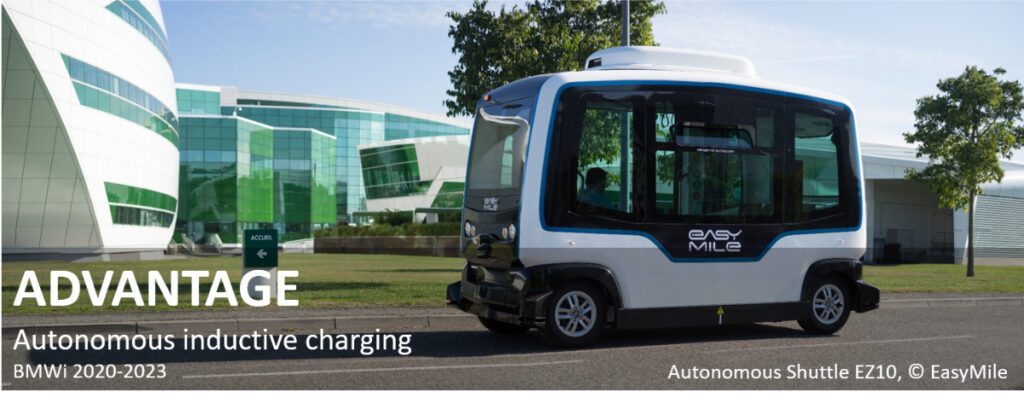Project ADVANTAGE: Autonomous driving, autonomous charging!
January 25, 2021 | The research project “ADVANTAGE – Automatic Inductive Charging of Autonomous Electric Vehicles in Logistics and Transport” started at the RLI in December 2020. This project aims at finding out more about how the charging processes of e-vehicles in public transport can be integrated into autonomous driving.
Autonomous driving can be an interesting component of the energy transition in transport, as it allows charging of e-vehicles at exclusively favorable times – i.e., when supply and demand just allow it from the point of view of the power grid and when it fits into operational procedures. Such a determination of charging time and quantity by a computer program is particularly feasible in logistics fleets and in public transport, since routes and travel times are usually recurring and can be planned. Because they can be planned, these transport sectors are also good use cases for autonomous driving.
Charging processes are left to software
In the ADVANTAGE project funded by the German Federal Ministry for Economic Affairs and Energy, an autonomously driving shuttle initially serves as a test vehicle. It collects data at a test site, providing the research team with the basis for automating charging processes. This includes information on personnel deployment, energy management, and network integration. By analyzing this data, it is possible to derive operating strategies in which the operating times of the vehicles are optimized and charging, and thus grid integration, can be carried out in a way that is gentle on the grid. It will also be analyzed how much of the required electricity for the shuttle could be generated directly on site from renewable sources. Following these analyses and simulations, the shuttle will go into pilot operation in the transport area of Regionalbus Ostbayern GmbH.
Pilot test provides data for larger fleets
If the prototype successfully charges autonomously in the RBO transport area, the concept could also be transferred to other areas of application. Even though autonomous vehicles currently use rather low charging powers for recharging, the transfer to entire bus fleets will eventually require higher grid connection powers. Therefore, the research and development of grid-friendly energy and fleet management systems is of great importance and is being investigated by RLI through simulations of autonomous fleets.
The project is led by ifak Magdeburg; partners in addition to RLI and RBO are Zollner Elektronik AG, EAI Elektro- und Automatisierungstechnik GmbH, PUK Group GmbH & Co. KG, and EasyMile GmbH. ADVANTAGE has a project duration of three years and is funded by the German Federal Ministry for Economic Affairs and Energy.
